
Browse our fun-packed, helpful plant-based articles, and delve deeper into this healthy, sustainable lifestyle!


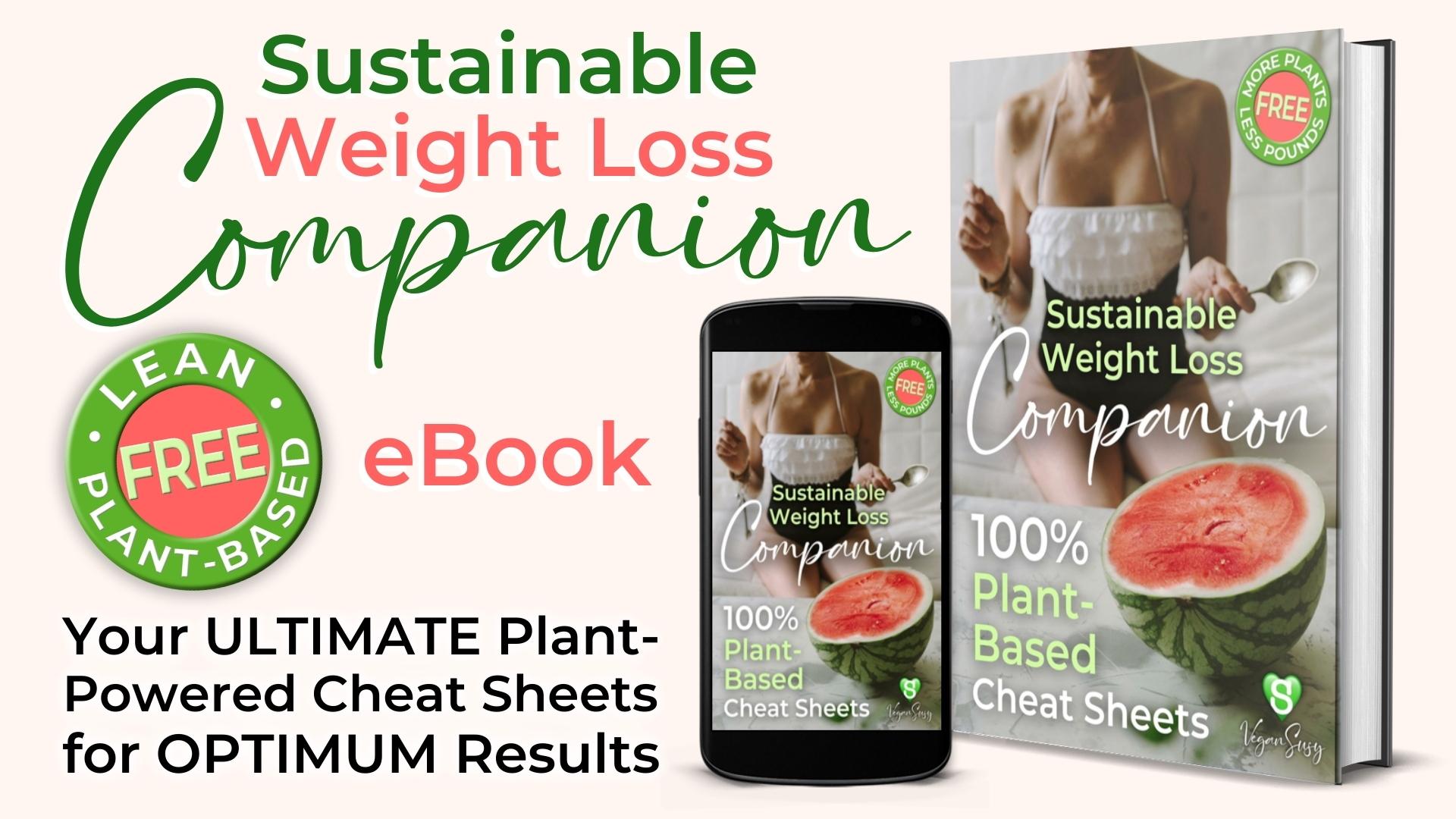
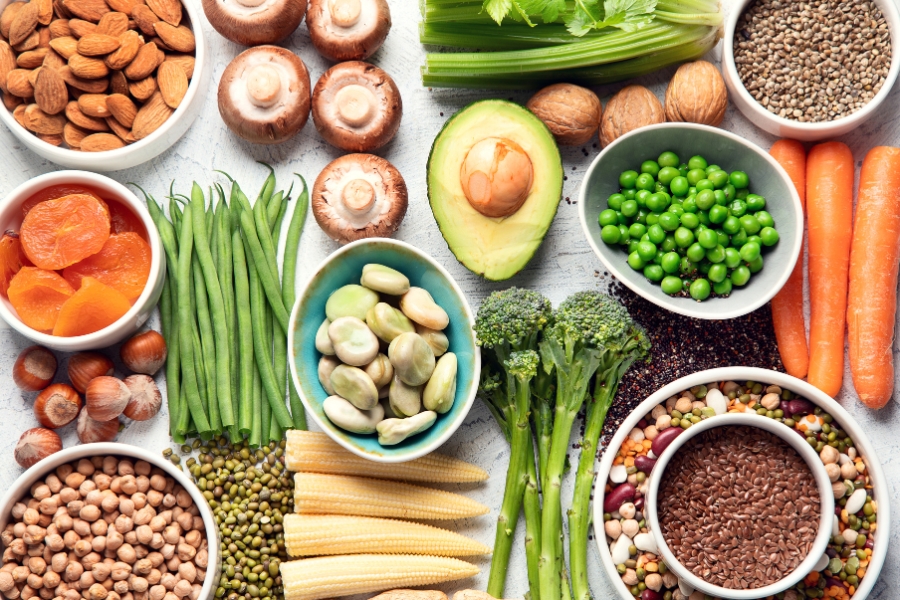
Plant-Powered Plate: Top Vegan Whole Foods for Plant-Based Weight Loss
Plant-Based Weight Loss For Women
Author: Plant-Based Susy
Finding a healthy balance between enjoying the foods and drinks you love and meeting your weight loss goals can be challenging. A big part is learning to fill your plate with the right foods. But what exactly are the best plant-based foods for weight loss?
When starting a plant-based diet with weight loss in mind, it’s essential to prioritise whole plant-based foods. It’s best to avoid processed foods when possible and reach for more nutritionally dense foods like legumes, nuts, seeds, fruits, vegetables, mushrooms and whole grains. These foods contain what your body needs to lose and maintain weight, such as fibre and vitamins.
Generally, those who follow plant-based diets have lower body weights than others. This tends to be due to whole foods, a lower calorie intake, and higher fibre content than many other diets. A study comparing plant-based diets to non-plant-based diets found that people who followed a plant-based diet lost significantly more weight at six months than others.
If you've ever wondered, "will a plant-based diet help me lose weight?" then you've come to the right place. Plants hold a lot of power when it comes to how you look and feel. Let's discuss some of the best vegan foods for weight loss.
If you’re looking for a practical way to get started, the More Plants💚Less Pounds 30-Day Program offers a flexible structure designed specifically for women over 40.
And if you’re ready to go deeper, this same 30-Day Jump Start also includes strength training and mindful eating support to help you reset without restriction.
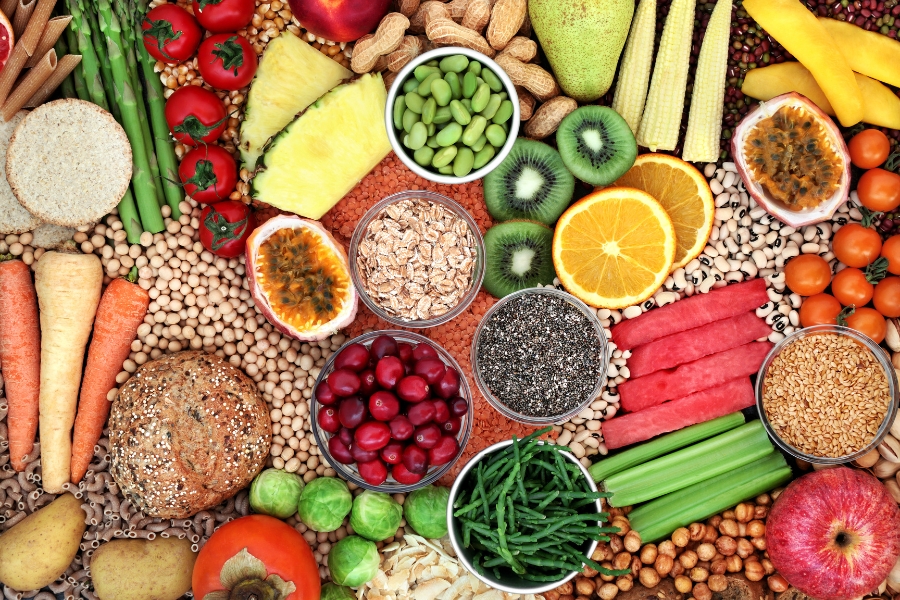
Table of Contents:
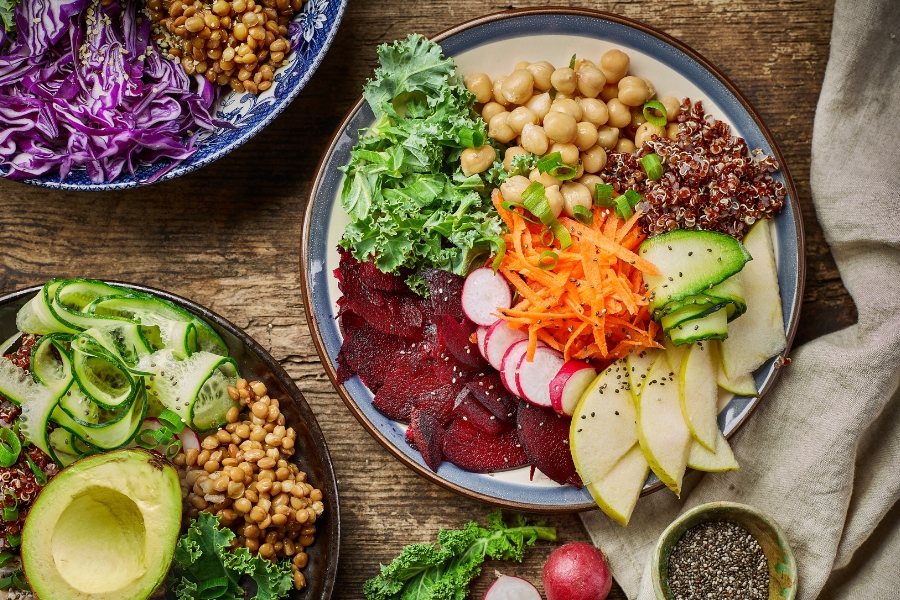
What does a healthy plant-based plate look like?
There is no one-size-fits-all plant-based weight loss diet that will help you reach your goals. The key is to pick and choose healthy vegan foods and avoid overindulging in processed and sugary treats.
Dieticians and nutritionists often differ in their views on what a proper plate of food should include, from what types of foods to the portion sizes. People also have different body goals and health aspirations. These differences mean one person may need more of a certain type of food while another needs less.
It can be hard to make sense of the differing opinions out there, but the vegan food pyramid is a great place to start. It’s important to give yourself grace, especially in the early stages of starting a new diet. Try not to be too strict or force yourself to meet these suggestions each day. Instead, treat it as a guideline and just do the best you can to fuel your body the way it needs.
The vegan food pyramid we use today looks slightly different than the one many grew up with. It advises 2 to 4 cups of veggies, 3 to 5 cups of whole grains, 1 to 2 cups of beans or seeds, and 1 to 2 cups of fortified dairy substitutes daily. Fats and sweets are also on the pyramid but should only be consumed in moderation. There are other pyramids out there, but these suggestions are a great place to start.
Eating too many processed foods can lead to clogged arteries and poor health. That's why picking more nutritionally dense foods is so important. If you're looking for the best plant-based foods for weight loss, keep on reading!
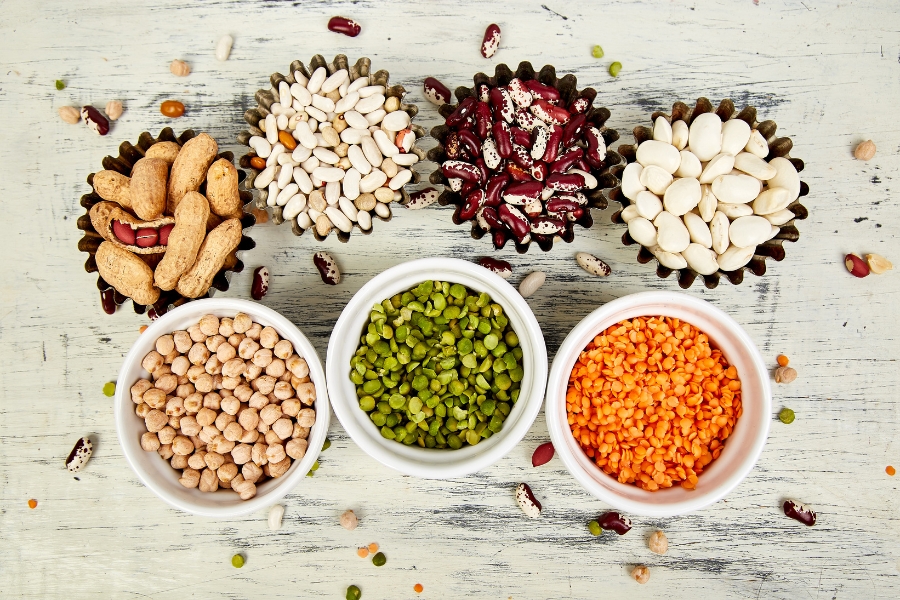
Legumes, pulses, and beans
Legumes are a type of vegetable that come in all sorts of colours, sizes, shapes, and textures. Around 16,000 types of legumes are grown throughout the world. While legumes technically refer to seed pods like green beans, peas, and peanuts, pulses, and beans tend to be looped in the mix. WebMD explains that all beans are legumes, but not all legumes are beans.
Pulses are the edible seeds found in legumes. They are harvested once fully mature, then dried, and often stored. Think lentils, split peas, and chickpeas. Pulses are enjoyed not only for their flavour but also for their protein content. Beans are a subgroup of pulses packed full of minerals, vitamins, fibre, and protein.
Legumes that tend to be consumed for their healthful content include:
Peanuts
Edamame (soya beans)
Black beans
Chickpeas
Green peas
Black-eyed peas
Kidney beans
Navy beans
Pinto beans
Lentils
Health benefits of legumes, pulses, and beans
Pulses like beans, peas, and lentils have been enjoyed for thousands of years worldwide. They can be grown in many places, making them a budget-friendly and nutritionally dense staple in countless parts of the world. According to the National Library of Medicine, pulses provide protein, fibre, and vitamins and minerals, including iron, zinc, magnesium, and folate.
Beans are packed full of antioxidants that help reduce cell damage from free radicals, which means that consuming beans helps prevent chronic disease. Beans also contain other phytochemicals, saponins, and tannings linked to a lower cancer risk. The insoluble fibre found in beans aids digestion and decreases constipation.
When it comes to weight loss, the protein and fibre found in legumes help people feel full longer. Plant-based protein also preserves lean muscle mass. If you're in tune with your body and the ways in which it communicates your hunger levels, that lasting feeling of fullness helps in weight loss and maintenance.
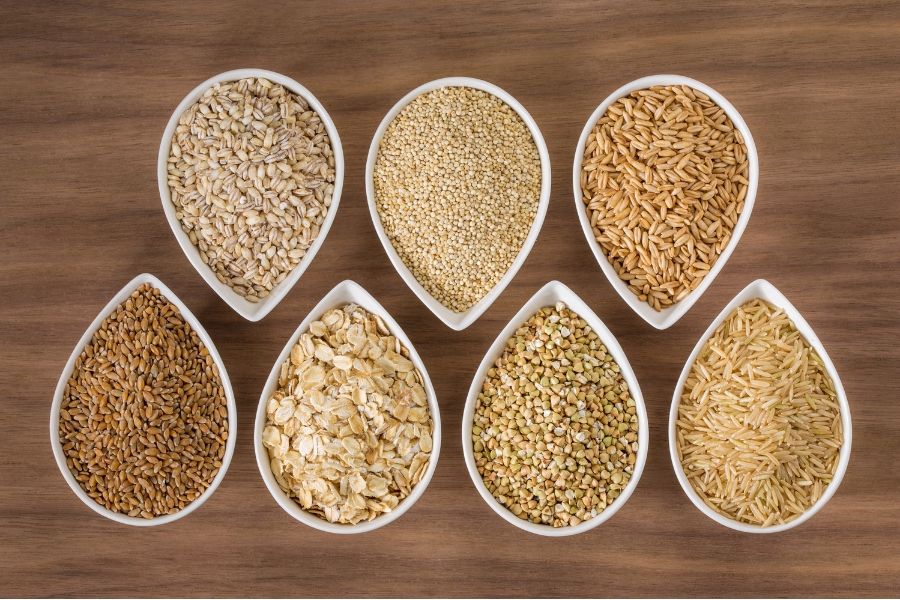
Whole grains
The grains you see filling the shelves at the grocery store include refined, enriched, fortified, and whole. Refined grains like pasta, white rice, and white bread are certainly fine in moderation, but there are better options if you're hoping to lose weight or tone up.
Whole grains contain all parts of the wheat plant, including the bran, endosperm, and germ. The whole grain being intact is what makes them better for you than other options. Each part of the grain contains essential nutrients, so whole grains make all the difference. While the complete list of whole grains is a long one, popular options you'll see include:
Barley
Brown rice
Wild rice
Buckwheat
Oats
Quinoa
Rye
Spelt
Corn
Health benefits of whole grains
According to the Mayo Clinic, whole grains help control cholesterol levels, weight, and blood pressure, lower the risk of diabetes and heart disease, and more. Dietary guidelines recommend that at least half of the grains you consume come from whole grains.
Protein and fibre are essential to weight loss; plenty are found in whole grains. Whole grains are a great source of vitamins and minerals, too. The nutrients found in whole grains include:
Iron
Magnesium
Phosphorus
Selenium
Vitamin A
Vitamin B-1 (thiamin)
Vitamin B-2 (riboflavin)
Vitamin B-3 (niacin)
Vitamin B-6 (pyridoxine)
Vitamin B-9 (folate)
Vitamin E
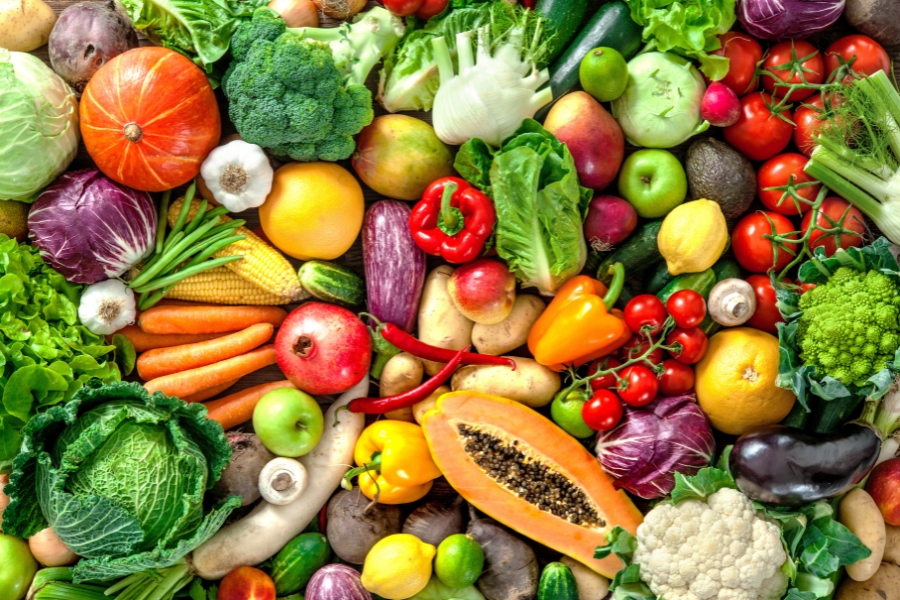
Vegetables and fruits
There are different types of vegetables, such as leafy greens, starchy vegetables, cruciferous vegetables, and many others. Leafy greens like spinach and kale are high in antioxidants and great for weight loss. Starchy vegetables are a good source of fibre but tend to be higher in calories and carbohydrates, so it's best to eat them in moderation.
Cruciferous vegetables are high in fibre and low in calories, making them an excellent option for those looking to lose weight. Some favourites include broccoli, cabbage, cauliflower, and radishes.
Vegetables tend to be low in calories and are great for overall health, but some are especially beneficial for vegans who want to lose weight. According to Food Network, some of the best weight-loss options include spinach, broccoli, spaghetti squash, Brussels sprouts, green peas, cauliflower, and sweet potato.
Fruits are full of fibre and water, which provides a feeling of fullness. This encourages better eating choices and makes people less likely to overeat. Some great weight-loss fruit options include grapefruit, apples, pears, and watermelon. Some fruits, like avocados, carry beneficial nutrients but are also high in calories, so it's best to be mindful of serving sizes.
Health benefits of vegetables and fruits
The biggest health benefit of vegetables and fruits is the fibre they bring to the table. Fibre normalises bowel movements, lowers cholesterol levels, helps control blood sugar levels, and can help you live longer. Fibre helps with weight loss because it reduces appetite.
To increase fibre consumption, it's best to eat the peel and membrane of fruits and veggies whenever possible.
To increase your intake of check out our Lean Plant-Based article on 10 easy ways to get more fruits and vegetables into your plant-based diet.
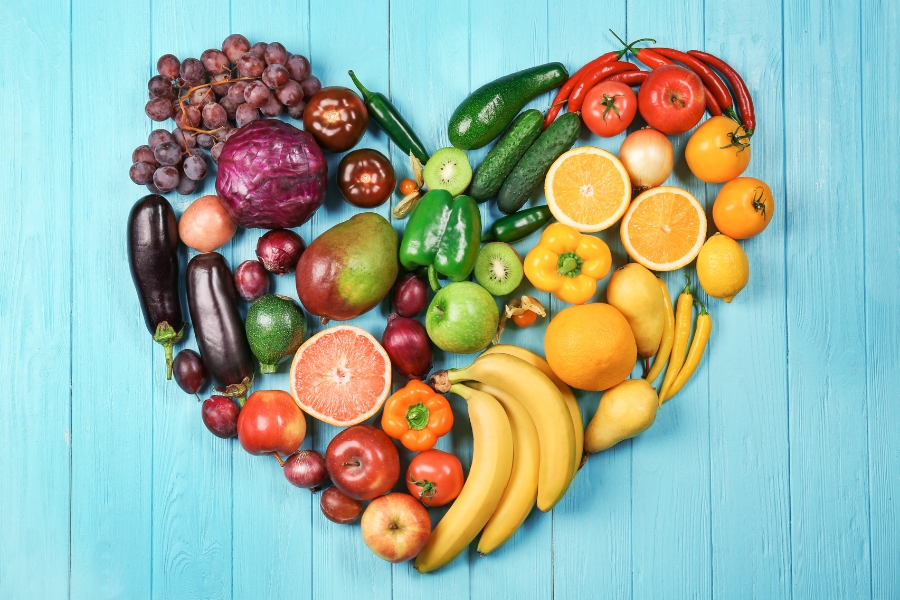
Be sure to eat a range of colours
Eating a variety of colours in fruits and vegetables is important. Different colours of these foods contain certain phytonutrients. Each unique colour is connected to a different nutrient, so to ensure you're getting all the ones you need, it's best to load your plate with as many colourful options as possible.
❤️ Red—Red fruits and vegetables contain plenty of vitamin C, vitamin A, potassium, and antioxidants like lycopene, which gives them the red pigmentation. This antioxidant offers sun protection and supports heart health. Examples include tomatoes, beets, red bell peppers, strawberries, raspberries, red apples, red grapes, cherries, red plums, and watermelon.
💛 Yellow and 🧡 Orange—Yellow and orange fruits and vegetables are packed full of vitamin C, vitamin A, and potassium. They are also considered good for vision and the immune system. Some of these tasty options are carrots, squash, yellow pepper, sweet potatoes, peaches, apricots, pumpkin, cantaloupe, and pineapple.
🤍 White—White fruits and vegetables support the heart and help control cholesterol levels. The anthoxanthins in these foods can help ease symptoms of asthma and reduce inflammation. They are also a great source of potassium. Solid options include cauliflower, potatoes, onions, garlic, mushrooms, and bananas.
💚 Green—Green fruits and vegetables are rich in chlorophyll, an antioxidant with many benefits, including clearing toxins and lowering cancer risk. These include broccoli, spinach, lettuce, kale, cucumbers, artichokes, Brussels sprouts, avocados, kiwi, and more.
💙 Blue and 💜 Purple—Blue and purple fruits and vegetables contain anthocyanins, which reduce inflammation, promote brain function, lower blood sugar, and fight viruses. The nutrients in these fruits and vegetables can also protect against diabetes, help heart function, and fight viruses. These tasty options include eggplant, plums, radishes, grapes, blackberries, blueberries, raisins, figs, and cranberries.
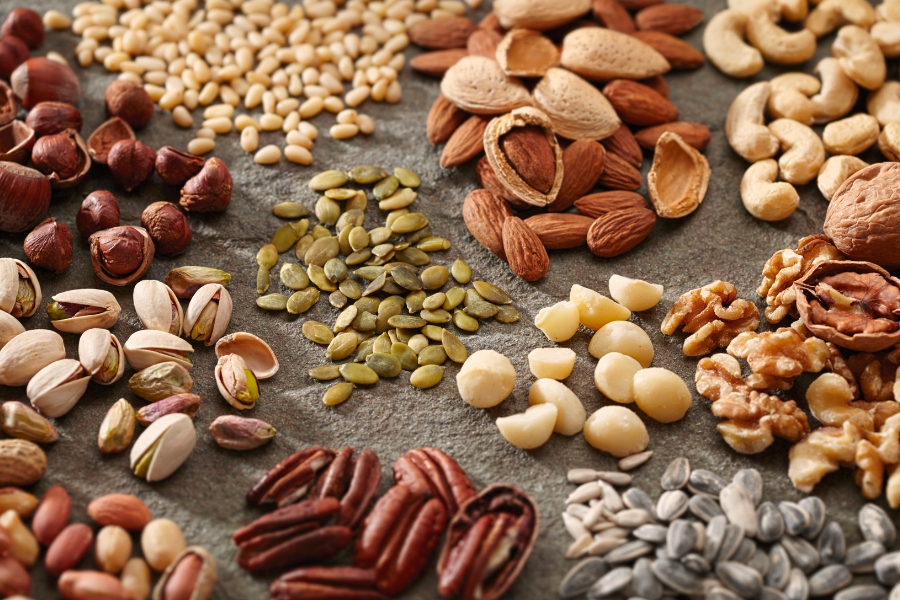
Seeds and nuts
Nuts might be high in fat and calories, but they can be a significant part of a healthy diet. This high-fat content often makes people fear eating too many nuts, but that should not be the case. Consuming nuts can protect against weight gain. They regulate body weight because their fats aren't fully absorbed.
Types of nuts include:
Pine nuts
Walnuts
Pistachios
Pecans
Peanuts
Macadamias
Hazelnuts
Cashew nuts
Brazil nuts
Almonds
Seeds are a great way to add some healthful nutrients to your diet. They tend to be high in protein and have many benefits, including better digestion and weight loss. However, they do contain fat and calories, so it's important to watch portions.
Tasty seeds include:
Chia seeds
Sunflower seeds
Poppy seeds
Sesame seeds
Flaxseeds
Pumpkin seeds
Hemp seeds
Health benefits of seeds and nuts
Nuts and seeds are a great source of protein, healthy fats, fibre, vitamins, and minerals. They have been found to protect against heart disease and diabetes. They are also low in saturated fats. Seeds are also packed with protein, minerals, vitamins, fibre, and healthy fats.
Both seeds and nuts help maintain weight. The big reason for this is that the fats in nuts are not fully digested or absorbed by the body. They also lower hunger levels, which leads to less overeating.
A connection has been found between nuts and fat loss in the abdominal area. Some nuts, including almonds and pistachios, have a thermogenic effect, slightly increasing resting metabolic rate. This helps your body burn more calories, even while you're resting or sitting around.
Yes, seeds and nuts contain fat, but that doesn't mean you should skip them. However due to the higher caloric content, you should always aim to eat them in moderation during a weight loss phase.
Nuts and seeds are a good source of healthy fats and are low in saturated fats. To receive the most benefits, reach for unsalted or unsweetened nuts. Adding too much additional salt or sugar can cancel out the good parts.
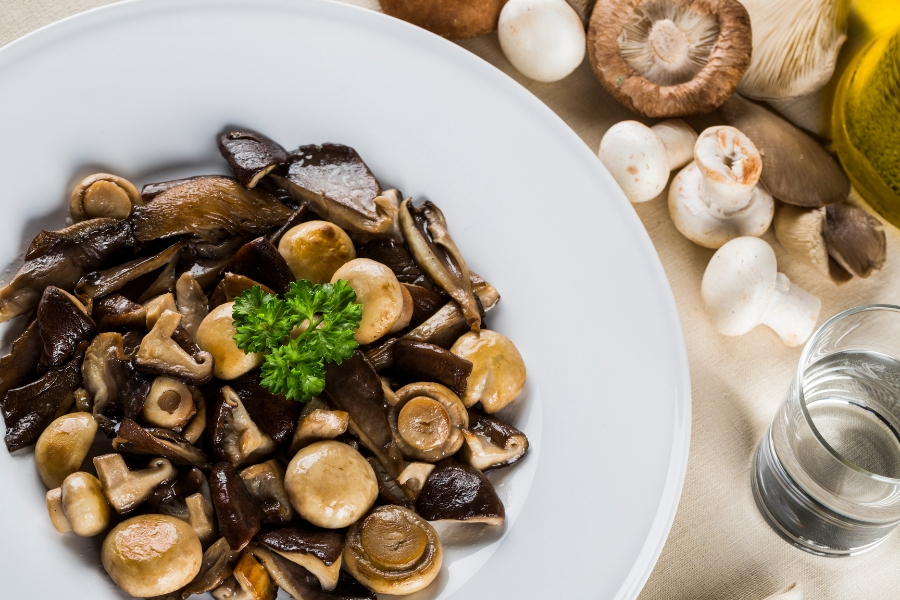
Mushrooms
Mushrooms, while not technically plants, are a fantastic addition to a whole food plant-based weight loss diet. They are low in calories, high in nutrients, and can add a satisfying umami flavour to various dishes. Their versatility and health benefits make them a valuable part of a balanced vegan diet.
Types of Mushrooms
Different types of mushrooms offer unique benefits and can be used in a variety of different dishes:
Portobello Mushrooms: Great meat substitutes, perfect for burgers or as a steak alternative.
Shiitake Mushrooms: Known for their immune-boosting properties.
Button Mushrooms: Commonly available and versatile in many recipes.
Chestnut Mushrooms: Also known as cremini mushrooms, they have a slightly firmer texture and a richer flavour compared to button mushrooms.
Oyster Mushrooms: These mushrooms have a delicate texture and a mild, savoury flavour, great for stir-fries and soups.
Enoki Mushrooms: Known for their long, thin stems and tiny caps, they have a crunchy texture and are perfect for salads and noodle dishes.
Health Benefits of Mushrooms
Mushrooms are packed with essential nutrients, including B vitamins, selenium, potassium, and vitamin D. Their high fibre content aids digestion and promotes a feeling of fullness, helping to control appetite and support weight management. Additionally, mushrooms are rich in antioxidants, low in fat, and contain no cholesterol, making them heart-healthy and suitable for a weight-loss diet.
How to Include Mushrooms in Your Diet
Incorporating mushrooms into your meals is easy and can significantly boost your nutritional intake:
Add to Salads: Slice raw mushrooms for a nutrient boost.
Use as a Meat Substitute: Replace meat in recipes with mushrooms for lower calorie options, such as this delicious Mushroom Spaghetti Bolognese recipe.
Sauté with Veggies: Combine with other vegetables for a fibre-rich side dish.
In Soups and Stews: Enhance the flavour and nutritional value of your soups and stews. Try this creamy Mushroom and Sweetcorn soup.
Stuffed Mushrooms: Create a low-calorie appetiser or main dish by stuffing mushrooms with healthy ingredients.
Mushroom "Fried" Rice: Try this healthy, tasty Chinese cuisine-inspired recipe, developed for a plant-based weight loss diet and cooked without oil.
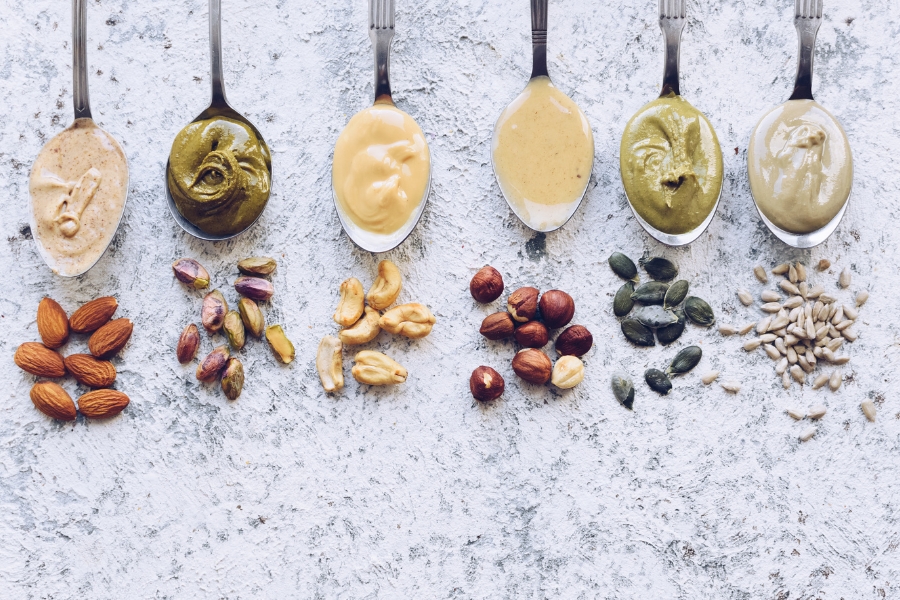
Here's the bottom line
As with any food, overindulging in even the healthiest options won't prevent weight gain. The foods listed above are packed full of nutritional benefits and can be helpful tools in achieving your weight loss goals, but any food eaten in large quantities has the potential to slow down or ruin your chance of succeeding on your journey.
Balance is key. Opt for healthier options like the ones listed above, but also keep track of your portion sizes and consume them in a way that aligns with your goals. This typically means eating in a caloric deficit.
The vegan food pyramid can be a helpful guide while you navigate these lifestyle changes. Remember, you can't simply do this for a while and expect lasting results. Switching up the foods you eat to nourish your body and keep it looking how you want should be a lasting change to your routine.
Dietary changes aren't the only necessary part of weight loss. The best approach is to pair healthier food choices with lifestyle changes. Making other healthy choices like using less oil in the kitchen and adopting a solid workout routine are great ways to turn your dream body into your reality.
There are a lot of experts out there willing to lend a hand and provide helpful insight on your journey. If you're ready to head down this and succeed in achieving the weight loss you're looking for, creating a positive relationship with food and listening to your body will make a huge difference.
The More Plants💚Less Pounds 30-Day Program is the perfect starting point for women over 40 ready to lose weight without restriction or overwhelm.
Frequently Asked Questions
Will a plant-based diet help me lose weight?
A vegan diet can be super beneficial for weight loss. The best approach is to focus on adding nutritionally dense whole foods and watching portion sizes. As with any diet, a calorie deficit can make a big difference in a weight loss journey. Switching to a plant-based weight loss diet can help you achieve your body goals.
What vitamins and nutrients aid in weight loss?
Adding vitamins or taking a supplement alone won't make you reach your weight loss goals, but they can help support a healthy metabolism and overall health. A balanced diet of vitamins and nutritious foods will get you closer to your goals. Iron, magnesium, zinc, vitamin A, vitamin C, and vitamin D have all been found to help lose weight as a vegan.
Vitamin D is essential for overall health, as it helps maintain strong bones and keep the immune system healthy. Studies have found a link between getting enough vitamin D and an increase in weight loss. It also helps limit weight gain and decrease body fat. Vitamin D has been found to alter the storage and formation of fat cells.
What are the best plant-based foods for weight loss?
Fruits, vegetables, nuts, seeds, legumes, and whole grains are great for weight loss. The important thing is following a whole-food, plant-based diet with as few processed and sugary items as possible. The list of vegan foods for weight loss goes on and on, but by focusing on eating nutritional-dense foods within these categories, you should be fine achieving your goals.
What foods lead to weight gain?
It's best not to assign moral value to foods or consider them wrong, but some foods, unless eaten in moderation, can lead to weight gain. Sugary drinks like soda and greasy sides like french fries can lead to weight gain. It's better to opt for water and healthier sides like vegetables.
Processed meat, red meat, and dairy products are also linked to the potential for weight gain. We don't want you to think that carbs are bad, but eating lots of simple carbs like muffins, cookies, cereal, and bagels can also contribute to weight gain.

💚 "Happy Plant-Based Eating & Exercising!" 💚

Plant-Based Susy
Plant-Based Nutrition Professional & Weight Loss Coach
Empower Yourself: Embark on a Delicious Fat Loss Adventure

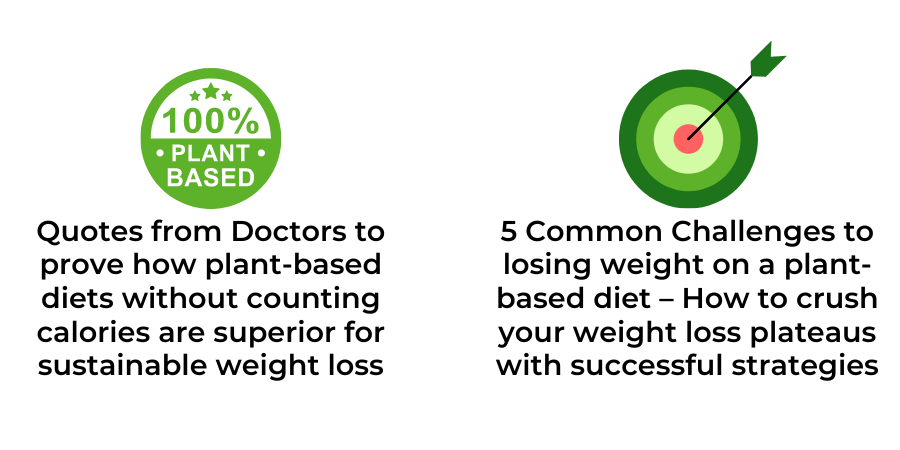
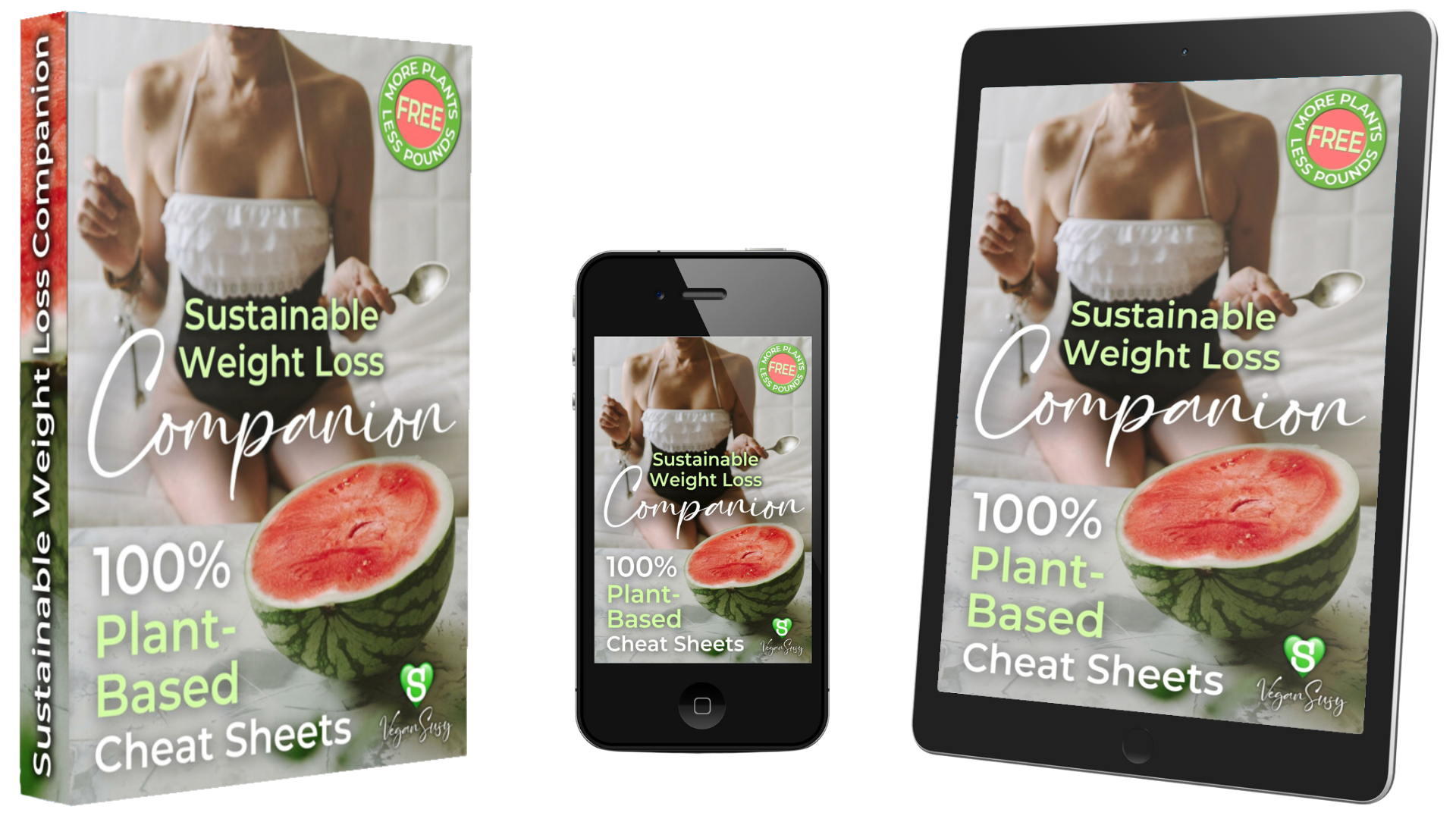
🍉 Get Ready to Jump Start Your Fitness Goals AND DISCOVER A HEALTHIER YOU!
🍉 Let's Make Your Fat Loss & Optimum Health Journey a Delicious Success Story!
🍉 Get The FREE Sustainable Weight Loss Companion eBook and CHEAT SHEETS!
More Free Resources
Unlock Your Transformation Today!


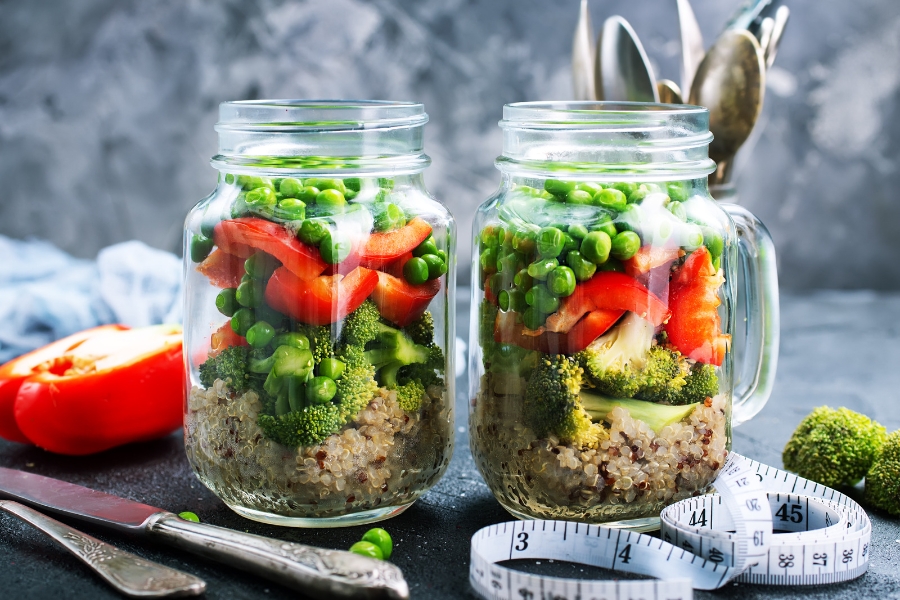
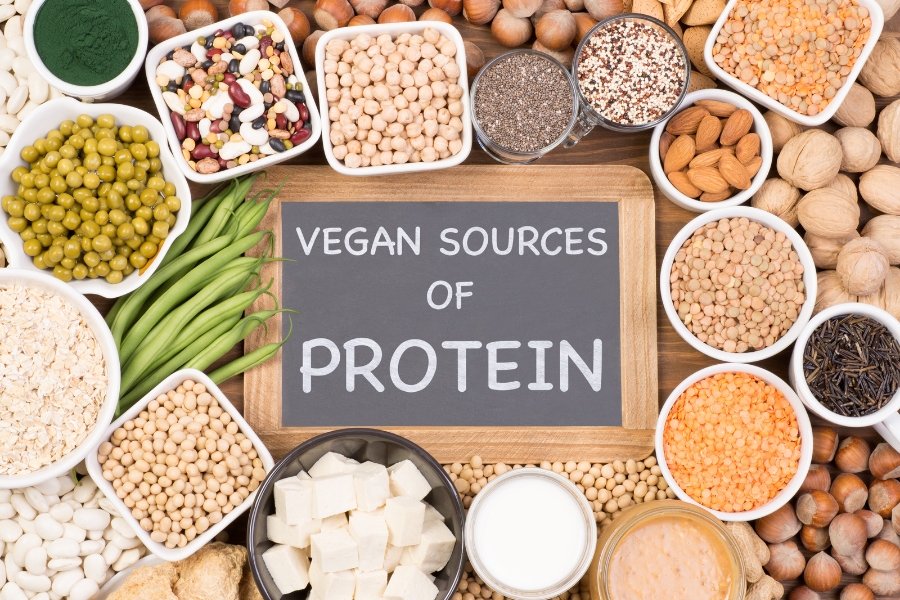

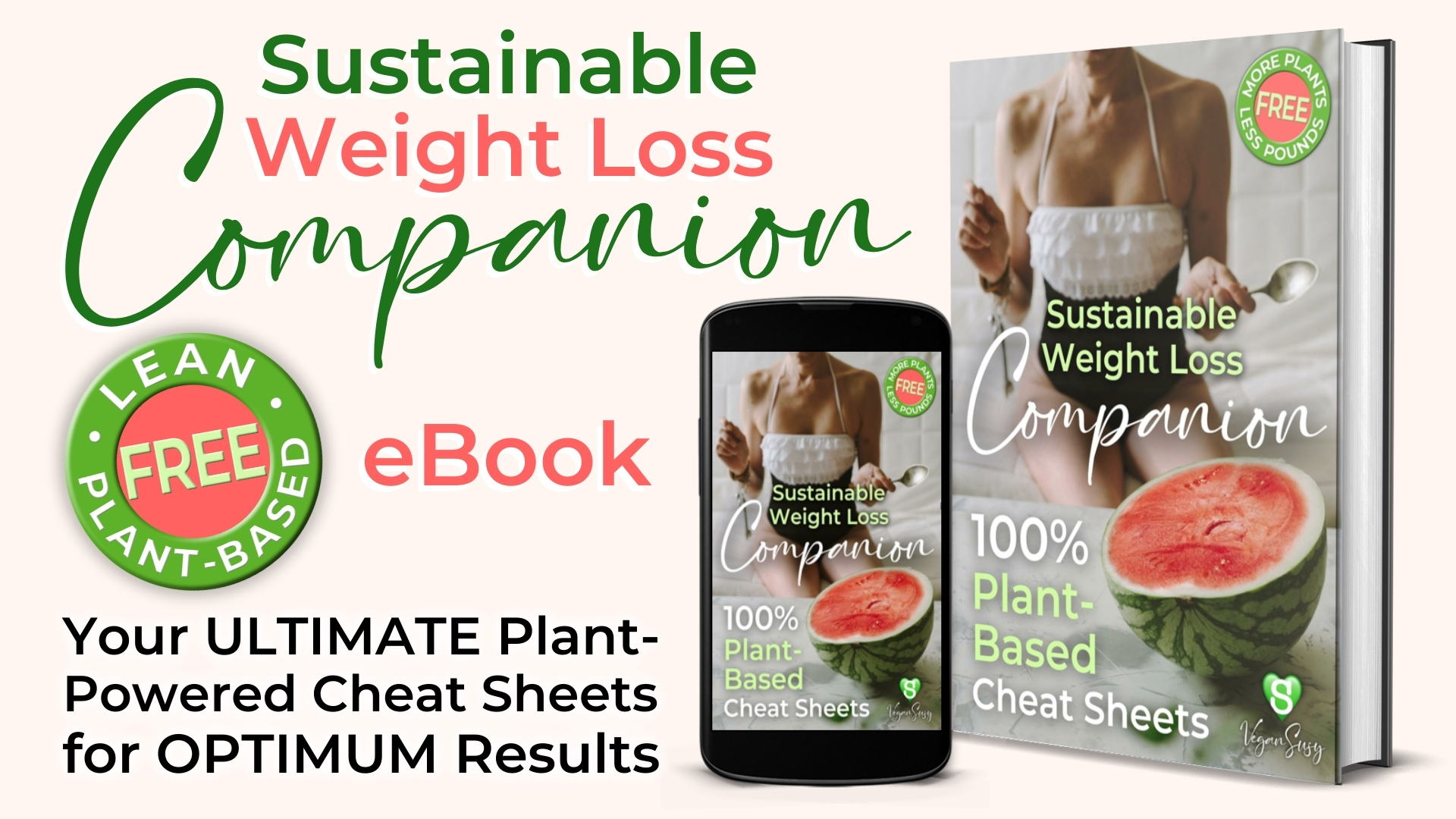






Facebook
Instagram
Youtube
Pinterest